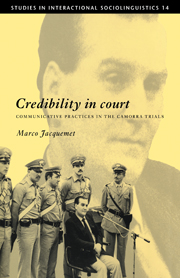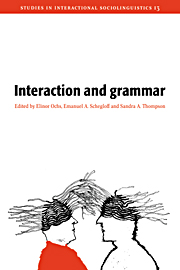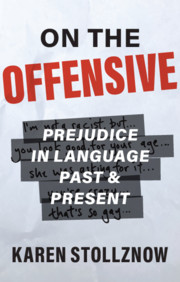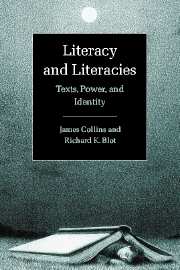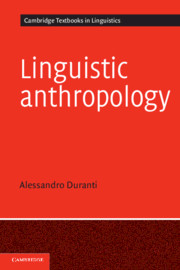Credibility in Court
The Camorra criminal trials, held in Naples, involved more than a thousand people charged with belonging to a criminal organisation, the Nuova Camorra Organizzata (NCO). In the winter of 1982–3 the NCO suffered the desertion of some of its key men who, once arrested, broke the code of silence (omertà), turned against their former associates, and collaborated with the Justice Department. In the initial set of trials their testimony was found sufficiently reliable and convincing to determine the convictions of more than 800 defendants, but in the appeal their credibility was destroyed and the majority of people convicted solely on these witnesses' testimony were acquitted. This study documents the shifting relationship between these witnesses - called pentiti - and the Justice Department. To investigate this dramatic reversal of the defendants' convictions Marco Jacquemet combines analysis of talk and power technologies with a reflection on truth and credibility as communicative representations.
- Studies courtroom interaction and practices
- Extensive analysis of actual recorded talk
- Examines communicative representation of cultural constructs such as truth and credibility
Reviews & endorsements
Review of the hardback: 'I was totally absorbed by this book. Jacquemet has that typical gift of ethnographer: he tells a good tale and he rightly does not allow his learning and academic imperatives to divert him from the task at hand.' Paul Robertshaw, Journal of Sociolinguistics
Product details
No date availablePaperback
9780521121286
340 pages
216 × 140 × 19 mm
0.43kg
Table of Contents
- 1. Introduction: men of honour, men of truth
- Part I. Constructing a Criminal World:
- 2. For a history of the present: how belonging to a community became a crime
- 3. The simulacra of the pentiti
- Part II. Constructing a convincing world:
- 4. On credibility (the pentito and the judge)
- 5. On knowledge (pentiti's narrative strategies)
- Part III. Constructing a Reliable World:
- 6. On indirectness (pentito v. defence lawyer)
- 7. On accountability (pentito v. judge)
- Part IV. Constructing an antagonistic world:
- 8. On respect (pentito v. defendant)
- 9. On truth (pentito v. pentito)
- Conclusions:
- 10. Justice, discourse, and society.

